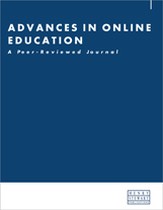Predicting learning depth through dialogue : A design-based approach to SOLO classification using Naive Bayes in online MBA education
Abstract
This study explores the intersection of dialogic pedagogy, cognitive complexity and artificial intelligence (AI) in the context of asynchronous online learning within a postgraduate Executive MBA (EMBA) programme. The research applies a Naive Bayes classifier, developed in Statistical Package for the Social Sciences (SPSS), to predict student learning outcomes based on the Structure of Observed Learning Outcome (SOLO) taxonomy using dialogic indicators coded from forum posts. The study integrates the Toolkit for Systematic Educational Dialogue Analysis (Tech-SEDA) framework — a tool for analysing the quality of educational dialogue — with SOLO levels to examine whether machine learning (ML) can reliably infer cognitive depth from qualitative features of asynchronous student interactions. Using a hybrid design-based research (DBR) methodology informed by Bannan-Ritland’s Integrative Learning Design Framework (ILDF), the study was conducted over three instructional cycles in an online MBA course hosted on Moodle. Across 1,273 forum posts, dialogic features such as reasoning with invitation (REI), challenge (CH), elaboration (EL) and reference to wider context (RW) were identified and analysed alongside sentiment scores, lexical diversity and behavioural metadata. The classifier achieved a predictive accuracy of 73.4 per cent, with strongest performance at SOLO Levels 3 and 4. Feature importance analysis confirmed that dialogic richness, rather than superficial metrics such as word count or thread depth, was most strongly associated with deeper cognitive engagement. Findings highlight how structured prompts, AI-generated scaffolds (eg ChatGPT-facilitated chain-of-thought [CoT] questions) and dialogic design can significantly improve the quality of online student contributions. Moreover, the use of SOLO as a predictive outcome reframes it from a summative assessment tool to a dynamic indicator of dialogic development. This work demonstrates how AI-enhanced educational analytics can support real-time insights and adaptive feedback while maintaining alignment with humanistic values and pedagogical integrity. Although limited by its single institutional context, the study offers a replicable and scalable model for embedding learning analytics into adult online education. This paper is also included in The Business & Management Collection which can be accessed at https://hstalks.com/business/.
The full article is available to subscribers to this journal (subscription is free).
Author's Biography
Vincent English Professor Vincent English is an academic and researcher specialising in the integration of artificial intelligence (AI) in education, leadership and sustainable energy solutions. He holds an MEd and EdD from the University of Cambridge and a PhD from the University of Birmingham. Currently, he serves as a Professor of Strategy at Università Telematica Internazionale (Uninettuno), Italy, alongside his role as Chief Executive Officer (CEO) of Longford International College, Ireland, where he oversees programmes in business and sports performance education. His research interests include AI’s impact on adult education, gender inclusivity in higher education and the role of transformational leadership in sports and business contexts. Vincent is also involved in projects assessing the feasibility of sustainable energy solutions, particularly the use of pyrolysis technologies in community-led micro-energy initiatives. He is dedicated to advancing knowledge on the socio-economic impacts of these technologies, with a focus on environmental sustainability and circular economy frameworks.
Noble Jagha Dr Noble Jagha is a distinguished academic, researcher and industry consultant specialising in digital technologies, business strategy and artificial intelligence (AI). Appointed as a Senior Lecturer and Manager of Curriculum Development at Longford International College, Ireland, in 2022, he plays a pivotal role in shaping executive education, curriculum innovation and digital transformation strategies across universities and businesses worldwide. His doctoral research at Università Telematica Internazionale (Uninettuno), which focused on ‘Bridging the Gap: Enhancing online executive learning through AI, dialogic pedagogy, and value-based education’, has led to strategic collaborations with universities across Europe and Africa, where he consults on improving engagement in online executive education through AI-driven learning strategies. Beyond academia, Noble brings extensive experience in robotics, computing and AI applications in manufacturing. His commitment to fostering innovation and bridging academia with industry ensures that he remains at the forefront of AI-powered learning and strategic education development.
Citation
English, Vincent and Jagha, Noble (2025, June 1). Predicting learning depth through dialogue : A design-based approach to SOLO classification using Naive Bayes in online MBA education. In the Advances in Online Education: A Peer-Reviewed Journal, Volume 3, Issue 4. https://doi.org/10.69554/EYKI7934.Publications LLP
